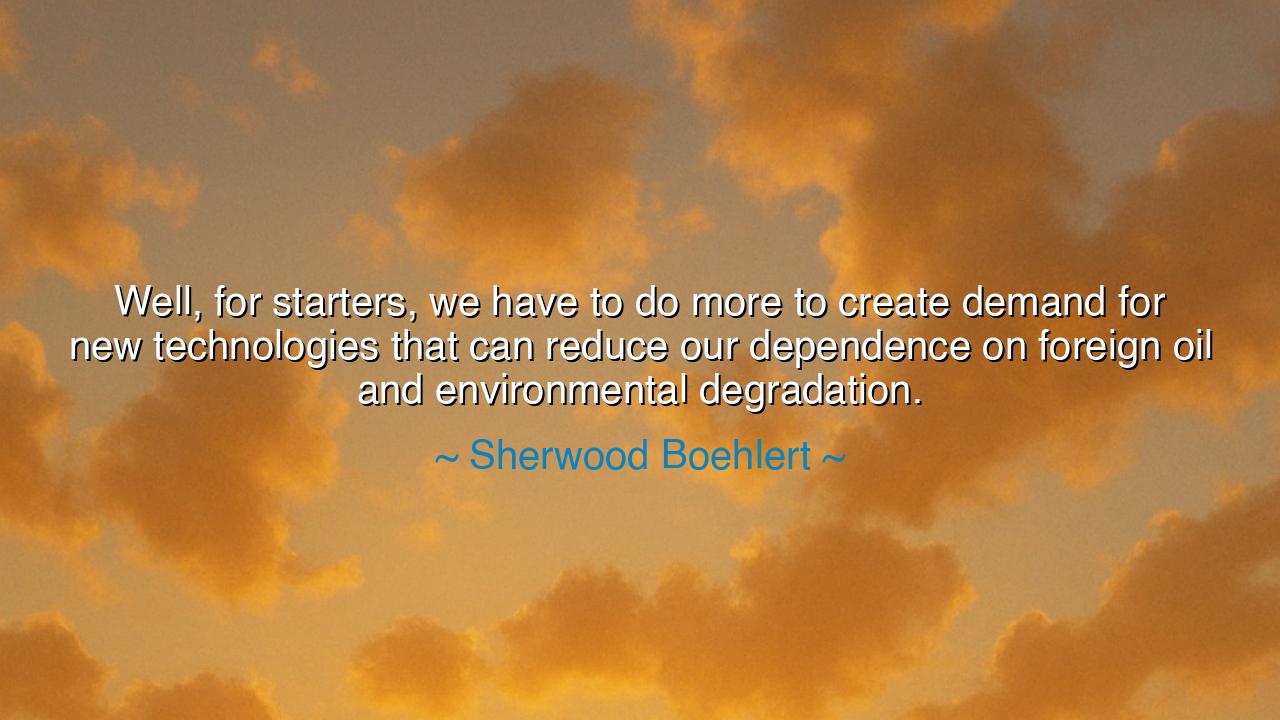
Well, for starters, we have to do more to create demand for new
Well, for starters, we have to do more to create demand for new technologies that can reduce our dependence on foreign oil and environmental degradation.






The words of Sherwood Boehlert, “Well, for starters, we have to do more to create demand for new technologies that can reduce our dependence on foreign oil and environmental degradation,” shine like a lantern in a darkened age. They remind us that the future is not forged by chance, but by will—by the deliberate cultivation of innovation that serves both the prosperity of a nation and the health of the earth. Boehlert, a statesman and long-time advocate of science and environmental responsibility, saw clearly that the path to security and sustainability lay not in clinging to the old, but in summoning the courage to build the new.
The origin of this declaration lies in the tumult of the early twenty-first century, when America and much of the world grappled with the double burden of energy dependence and environmental decline. Foreign oil, drawn from distant lands, not only drained wealth but bound nations to unstable powers and fragile alliances. At the same time, the burning of fossil fuels darkened the skies, poisoned the air, and advanced the great specter of climate change. Boehlert’s words came as both warning and guide: that the way forward must be through new technologies—through ingenuity that frees people from dependence while preserving the living earth.
History gives us a story in the saga of the Apollo program. When the United States set its will upon reaching the moon, it did not wait for natural demand. The government, the people, the industries of the nation together created the demand for rockets, spacecraft, and scientific breakthroughs. Out of this effort came not only footprints upon lunar soil but cascades of technologies—computers, materials, telecommunications—that transformed daily life. Boehlert’s call is of the same spirit: that when humanity chooses to direct its collective will, the impossible becomes possible, and the fruits of innovation enrich all.
The deeper meaning of Boehlert’s words is that progress requires direction. Left alone, the market may cling to what is cheap and known, even when it destroys the world. But when leaders and citizens alike create demand for clean energy, for sustainable industry, for technologies that restore rather than ravage, then the tide of invention flows toward renewal. It is not enough to wish for change; demand must be summoned, goals must be set, and courage must be shown to invest in the future rather than to consume the past.
Yet there is also warning here. For if societies fail to create demand for the new, they will remain chained to the old. Dependence on foreign oil will continue to distort politics and invite conflict. Dependence on polluting energy will deepen the wounds of climate, water, and air. To refuse innovation is to choose stagnation, and stagnation in the face of crisis is collapse. Boehlert’s words thus carry urgency: that the time to act is not tomorrow but now, for delay only multiplies peril.
The lesson for us is clear: each generation must be bold in what it demands. Citizens must demand from their leaders investment in clean energy and technologies that protect the earth. Communities must demand from businesses goods that are sustainable, not destructive. Individuals must demand of themselves habits that reduce waste and support renewal. Demand is power, for demand shapes markets, drives invention, and builds the future. Without it, progress lies dormant; with it, even the most daunting challenges can be overcome.
Therefore, let us live as visionaries and stewards. Let us create demand not only with our voices but with our choices—choosing clean power when possible, supporting innovation through education and investment, lifting leaders who champion sustainability rather than short-term gain. In this way, each of us becomes part of the great engine of renewal, each of us a spark in the fire of innovation that Boehlert urged us to kindle.
So let his words endure as a guiding principle: “We have to do more to create demand for new technologies…” This is both a call to action and a prophecy. If we heed it, we may enter an age of energy freedom, environmental healing, and shared prosperity. If we ignore it, we will remain prisoners of dependence and degradation. The choice is ours, and the future awaits the courage of our demand.






AAdministratorAdministrator
Welcome, honored guests. Please leave a comment, we will respond soon